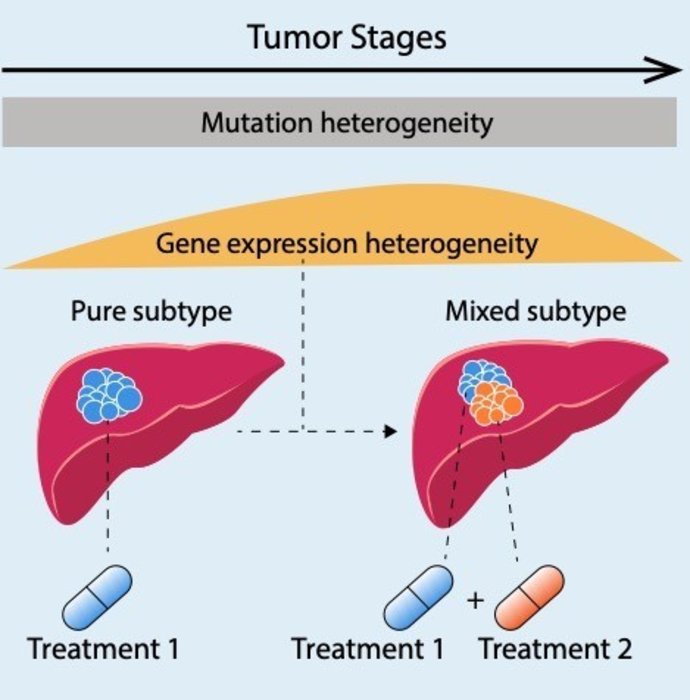Study Calls for Novel Strategies to Target Dynamic Genomic Landscape in HCC
 Research from one of the largest prospective cohorts for HCC, the Precision Medicine in Liver Cancer across Asia-Pacific Network (PLANet) study, have described a dynamic genomic landscape of tumor heterogeneity in hepatocellular carcinoma (HCC). Clinicians and researchers from the National Cancer Centre Singapore (NCCS) and A*STAR’s Genome Institute of Singapore (GIS), in collaboration with Singapore General Hospital (SGH), the National University Health System, Duke-NUS Medical School, Nanyang Technological University, and collaborators from China, Malaysia, Thailand and the Philippines all participated in the study published in the National Science Review.
Research from one of the largest prospective cohorts for HCC, the Precision Medicine in Liver Cancer across Asia-Pacific Network (PLANet) study, have described a dynamic genomic landscape of tumor heterogeneity in hepatocellular carcinoma (HCC). Clinicians and researchers from the National Cancer Centre Singapore (NCCS) and A*STAR’s Genome Institute of Singapore (GIS), in collaboration with Singapore General Hospital (SGH), the National University Health System, Duke-NUS Medical School, Nanyang Technological University, and collaborators from China, Malaysia, Thailand and the Philippines all participated in the study published in the National Science Review.
There is currently no validated predictive biomarker for systemic therapies in HCC and treatment efficacy remains poor. To address this unmet clinical need, a collaborative multi-disciplinary and multi-institutional team was awarded funding to establish the Translational and Clinical Research (TCR) Flagship Programme in Liver Cancer, which is supported with funding from the National Research Foundation Singapore and administered by the Singapore Ministry of Health’s National Medical Research Council (NMRC)[3]. In this program, the PLANet study was initiated to enroll a prospective HCC patient cohort working with the Asia-Pacific Hepatocellular Carcinoma (AHCC) Trials Group across multiple Asian countries. Specifically, PLANet aims to understand molecular diversities within a tumor known as intra-tumor heterogeneity (ITH), as well as how we can use such understanding to guide patient stratification and treatment in HCC. In 2017, the group discovered that HCC has a wide range of genetic ITH across patients.
The current study is based on a cohort of 67 patients from four Asian countries from the PLANet study and is the first study of ITH across multi-omic data layers (genome, transcriptome, immunome) in HCC. Researchers found variations in different regions of the same tumor for both genetic (DNA mutation) and transcriptomic (RNA expression) profiles. In particular, they found that the level of such variations differs across patients and over 30% of patients show a high transcriptomic ITH where a single tumor could contain multiple transcriptomic subtypes.
Such dynamic, evolutionary process in HCC helps to explain the poor response to systemic therapy in HCC, where therapies addressing only a single group of molecular targets is not sufficient. Using the PLANet cohort, the authors demonstrated how combination therapies can potentially address the high ITH to increase treatment response rates for HCC. Discoveries from this research provide novel scientific rationale for the development of innovative therapies for HCC. In the next phase, the group will focus on how to improve liver cancer treatment outcome by targeting this dynamically evolving heterogeneity.
The PLANet study has also provided researchers and clinicians an atlas to assess the evolutionary history of liver cancer. Such genomic information will provide a solid basis for understanding how individual patients might respond differently to drug treatments, thus enabling a precision medicine approach to treat patients differently in the future. Data from this study is now publicly available via the Singapore Oncology Data Portal (OncoSG), which allows integration, visualization, analyses, and sharing of cancer genomics datasets generated in Singapore.
Dr Zhai Weiwei, a former principal investigator at GIS who co-led this work, noted, “This study depicted the first full landscape of tumor heterogeneity in HCC, providing a solid basis harnessing tumor evolution for patient prognosis and treatment”.
Professor Pierce Chow, senior author of the study, the overall principal investigator of PLANet and Senior Consultant, Department of Hepato-Pancreato-Biliary/Transplant Surgery, Division of Surgery and Surgical Oncology at SGH and NCCS said, “I have been treating HCC for more than 20 years and have conducted multi-national clinical trials in this cancer, but HCC remains a very challenging malignancy. Significant scientific breakthroughs are required to further improve patient outcomes and our current findings provide an important step in this direction.”